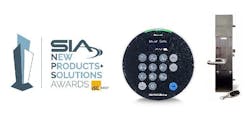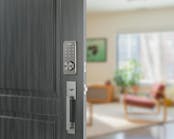Two years ago I was invited to a demonstration of a new lock product. The unique feature of this new product was that it could be opened and locked with a smart cell phone. The lock did operate as advertised but the usefulness was a question because according to published statistics only 19 percent of cell phones sold in 2010 were smart phones. However, 2011 published figures show that 46 percent of all cell phones in use are now smart phones. During 2012, over 650 million smart phones are expected to be sold.
Nine out of 10 people in the USA own a cell phone and this has virtually eliminated the existence of pay phone booths. Big, clunky cell phones of the 1980s and 1990s have been supplanted by small, thin pocket models that the public cannot do without. Since almost every man, women and child already carries a cell phone, it is only natural that new uses such as opening doors will become available.
Several companies featured cell phone technology for locks at the International Security Conference (ISC) this Spring. Salto Systems personnel reported that they had incorporated near field communication (NFC) into Salto locks two years ago. Assa Abloy presented an informative demonstration for several hundred invited guests at ISC showing how their lock products will be able to be operated by a cell phone and NFC technology. Other major lock companies either have NFC technology or will have it shortly.
Linus Yale invented the modern pin tumbler lock in 1865. 147 years is a long time for any invention, especially with the fast pace of new inventions today. New Applications (apps) are appearing every day for cell phones. Cell phone lock control apps can do the same job as their mechanical counterparts and the changes can be done instantly without lock disassembly: control access by individual door (masterkeying) and add or remove users (change combinations). Apps can also do operations which are impossible with mechanical locks; setting time usage so users can only enter at set hours or cannot enter during holidays or weekends and accessing audit trails to discover what user operated the lock and when it was operated.
Mechanical lock cylinders will continue to exist as they do now in hotel locks and in automotive doors as a backup in case of electronic failure. For many other commercial and residential applications the future belongs to electronics and right now the smart cell phone appears to be the 'key' of the future.





